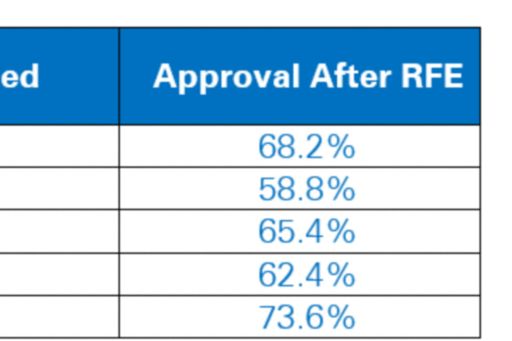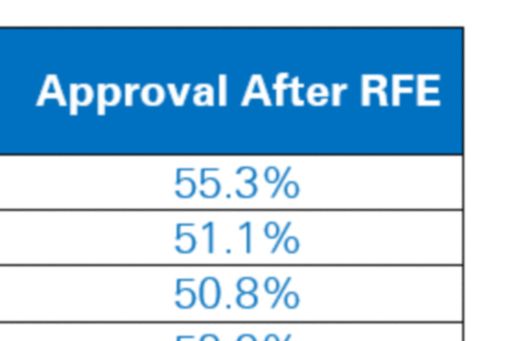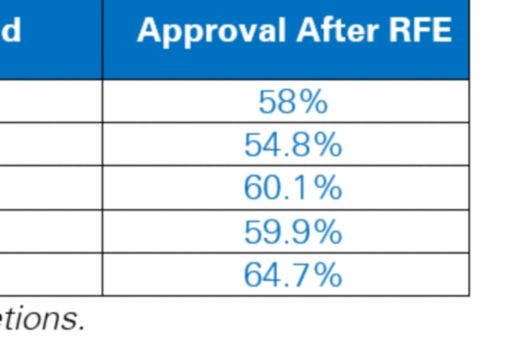United States – USCIS Publishes Quarterly Data on Key Temporary Worker Visas
US-USCIS Publishes Quarterly Data on Certain Key Visas
On May 1, 2020, the U.S. Citizenship and Immigration Services (USCIS) published its statistics on the rates of approval, denial, and request for evidence (“RFE”) issued for common temporary worker visa petitions processed during the second quarter (Q2) FY2020, ending March 31, 2020. The latest data show that the rates of RFE remained high for H-1B, L-1, and TN petitions.

On May 1, 2020, the U.S. Citizenship and Immigration Services (USCIS) published its statistics on the rates of approval, denial, and request for evidence (“RFE”) issued for common temporary worker visa petitions processed during the second quarter (Q2) FY2020, ending March 31, 2020.1 The latest data show that the rates of RFE remained high for H-1B, L-1, and TN petitions, with slight increases in approval rates for each of these temporary worker visa categories as compared to Q2 FY2019.
WHY THIS MATTERS
The latest USCIS data confirm what many employers have perceived is an ongoing trend: that the USCIS continues to highly scrutinize nonimmigrant visa petitions, consistent with the directive under the “Buy American, Hire American” Executive Order.2 Given the increased scrutiny on nonimmigrant visa petitions, employers should be prepared to provide in their visa application submissions, detailed job descriptions of the positions they are seeking to fill, as well as documentation relating to the foreign national employees’ qualifications to fill such positions.
Additionally, as covered in our previous GMS Flash Alert 2020-198 (April 7, 2020), President Trump issued a proclamation suspending the entry of certain immigrants to the United States due to the COVID-19 pandemic.3 While this proclamation has no immediate impact on nonimmigrants, it does, however, provide the U.S. Department of Homeland Security and the U.S. Department of Labor 30 days to review nonimmigrant visa programs and recommend other measures to help ensure the prioritization, hiring, and employment of U.S. workers. This mandate leaves open the possibility that certain temporary foreign workers may be subject to restrictions in the foreseeable future, which could lead to an increase in RFE and denial rates for nonimmigrant employment categories in Q3 and Q4 of FY2020.
Key Findings from the USCIS’s FY2020 Q2 Statistics
Background
The USCIS publishes quarterly statistics on the rates of approval, denial, and RFE issued for various temporary worker, also known as nonimmigrant visa categories. Data are provided for petition filings submitted to the USCIS requesting the following visa classifications: H-1B, H-2A, H-2B, L-1A, L-1B, O, P, R-1, and TN.
USCIS issues written notices in the form of a request for evidence (RFE) to request missing initial or additional evidence from applicants and/or petitioners when the USCIS requires more information in order to issue a final decision on the application for an immigration benefit. The recent data released by the USCIS indicate that RFE rates continue to be high for many nonimmigrant visa categories, although there appears to be a modest increase in the number of petitions receiving approvals without an issuance of an RFE. The heightened scrutiny on nonimmigrant visa petitions remains a consistent trend since FY2018, when the Trump administration issued the Buy American, Hire American Executive Order.
H-1B Petitions
The statistics published by the USCIS relating to the adjudication of H-1B petitions in Q2 of FY2020 are as follows:

In Q2 FY2020, the H-1B approval rate was 87.1%, which represents an increase of almost 4% from Q2 FY2019. The RFE rate for Q2 FY2020 was 35.8%, up 0.5% from the same period in FY2019. For petitions where an RFE was issued, the approval rate after RFE for Q2 FY2020 was 68.2%, which is an increase of almost 10% from Q2 FY2019.
Compared to the period prior to the Buy American, Hire American Executive Order, the rate of initial denials for H-1B visas has more than doubled, from 7.4% in FY2017 to 15.2% at the end of FY2019. Having said that, the initial denial rates for H-1B visas in Q2 FY2020 show a slight decrease from the same period in FY2019.
L-1 Petitions
The statistics published by USCIS relating to the adjudication of L-1 petitions in Q2 of FY2020 are as follows:

Please note that the above statistics do not include outcomes of L-1 visa applications processed by consular officers stationed at U.S. Consulates and Embassies, as well as by U.S. Customs and Border Protection officers at the ports-of-entry.
In Q2 FY2020, the L-1 approval rate was 74.3%, which represents an increase of almost 2.5% from Q2 FY 2019. The RFE rate was 53.6% in Q2 FY2020, up 0.4% from the same period in FY2019. For petitions where an RFE was issued, the approval rate after RFE for Q2 FY2020 was 55.3%, which is an increase of just over 4% from Q2 FY2019.
Compared to the period prior to the Buy American, Hire American Executive Order, the rate of initial denials for L-1 visas has increased by almost 10%, from 19.2% in FY2017 to 28.1% at the end of FY2019. However, the initial denial rates for L-1 visas for Q2 FY2020 show a slight decrease from the same period in FY2019.
TN Petitions
The statistics published by the USCIS relating to the adjudication of TN petitions in Q2 of FY2020 are as follows:

Please note that the above statistics do not include outcomes from TN visa applications processed by consular officers at U.S. Consulates and Embassies, as well as by U.S. Customs and Border Protection officers at the ports-of-entry.
In Q2 FY2020, the TN approval rate was 88.7%, which represents a slight increase of 0.3% from Q2 FY 2019. The RFE rate was 25% in Q2 FY2020, up 0.5% from the same period in FY2019. For petitions where an RFE was issued, the approval rate after RFE for Q2 FY2020 was 58%, which is an increase of just over 3% from Q2 FY2019.
Compared to the period prior to the Buy American, Hire American Executive Order, the rate of initial denials for TN petitions has gradually increased, from 8.4% in FY2017 to 10.2% at the end of FY2019. Having said that, the initial denial rates for TN petitions for Q2 FY2020 show a slight decrease from the same period in FY2019.
KPMG NOTE
KPMG Law LLP in Canada is tracking USCIS adjudication trends closely, and will endeavor to keep GMS Flash Alert readers informed of any further developments as and when they occur.
FOOTNOTES
1 To review USCIS’s FY 2020 Q2 data for the different nonimmigrant visa classifications, click here (PDF 317 KB).
2 To read the Trump administration’s Buy American, Hire American Executive Order of April 18, 2017.
3 For our GMS Flash Alert on the “Presidential Proclamation to Temporarily Suspend Immigration,” click here.
VIEW ALL
* Please note that KPMG LLP (U.S.) does not provide any immigration services. However, KPMG Law LLP in Canada can assist clients with U.S. immigration matters.
The information contained in this newsletter was submitted by the KPMG International member firm in Canada.
SUBSCRIBE
To subscribe to GMS Flash Alert, fill out the subscription form.
© 2024 KPMG LLP, a Canadian limited liability partnership and a member firm of the KPMG network of independent member firms affiliated with KPMG International Cooperative (“KPMG International”), a Swiss entity. All rights reserved.
GMS Flash Alert is a Global Mobility Services publication of the KPMG LLP Washington National Tax practice. The KPMG name and logo are trademarks used under license by the independent member firms of the KPMG global organization. KPMG International Limited is a private English company limited by guarantee and does not provide services to clients. No member firm has any authority to obligate or bind KPMG International or any other member firm vis-à-vis third parties, nor does KPMG International have any such authority to obligate or bind any member firm. The information contained herein is of a general nature and is not intended to address the circumstances of any particular individual or entity. Although we endeavor to provide accurate and timely information, there can be no guarantee that such information is accurate as of the date it is received or that it will continue to be accurate in the future. No one should act on such information without appropriate professional advice after a thorough examination of the particular situation.
